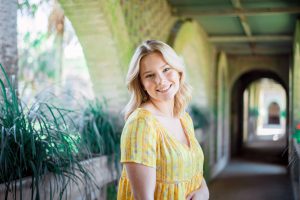On The Power of Faith, Activism, and Educational Conversation
The Power of Faith, Activism, and Educational Conversation
by Cora Parker, ’25

What role do Faith and Activism play in modern society? The annual Butler Seminar on Religion and Global Affairs plans to answer exactly within the four part lecture series: Faith and Activism.
For 22 years the Seminar has brought “Scholarship in combination with realistic language for the matters of daily life,” said Assistant Director of Butler University’s Center for Faith and Vocation, Marguerite Stanciu. The Center for Faith and Vocation, commonly referred to as the “Blue House ” across from the Howard L. Schrott Center for the Arts, remains a main producer of the Seminar from its inaugural series, continuing into this year’s fully first in-person production since the start of the COVID-19 pandemic.
Looking deeper into this year’s Seminar topic and its relation to society of today, Stanciu said the pandemic greatly influenced their conversations. During the midst of the pandemic, isolation was a feeling shared between all demographics of people. Those who identify with a background of faith or spirituality felt this divide within themselves, but also from a lack of engagement with other faith communities.
“We saw how the human desire for connection is related to one’s spiritual individuality and decided it would be a relatable idea to build the first in-person Seminar around, as we [hopefully] continue to round the corner from the Coronavirus” said Marguerite Stanciu.
Isolation and activism don’t typically go hand and hand, but what was once “typical” in a pre-pandemic world is now of slim significance. In 2022 activism can take on many forms, incorporating it into interfaith, a key theme of the event, Dr. Brent Hege, director of the 2022-2023 Seminar, as well as the 2015-2016 and 2018-2019 Seminars, defines interfaith activism as “the coming together of people who orient around religion differently to advocate for change.” Advocating for change doesn’t need take form in groundbreaking fashions, it “can happen in any number of ways, big and small, from an interfaith dialogue about the resources in the various religions traditions and no religious affiliation working side by side at a food pantry to a group of diverse religious and secular people protesting an unjust law or institution or act of injustice and oppression.” At its core, it should be “[rooted in] finding a common ground with people who orient around religion differently and realizing that, while our specific religious, theological, philosophical, or ethical motivations are beautifully diverse, [and] find[ing] common ground in advocacy and activism” said Dr. Hege.
In the first section of the four-part series, the lecture revolved around Youth Engagement in Interfaith Activism. When questioned about the choice of making the kickoff session focused on a younger generation, Dr. Hege answered that sparking youth engagement in any type of activism is important, but specifically in interfaith work, young people are the frontline defense for the “existential crisis [that is] the future of humanity.”
Just as new generations are born and others pass, the post COVID-19 era is buzzing with focus on youth empowerment. “Older generations did their part, but they have fallen short in so many ways. Younger people have the benefit of seeing more clearly just how older generations have fallen short [, and] the benefit of energy and enthusiasm and a certain idealism.” The igniting factor connecting youth activism and interfaith work, said Dr. Hege, and reiterated in the keynote speaker Tahil Sharma’s lecture: “these movements can’t succeed without paying attention to religion.”
The second session of the Faith and Activism Seminar will convene in the Shelton Auditorium Tuesday, Oct 25 at 7:00 PM. Faith and Activism in Indiana is an opportunity to hear from a distinct panel of speakers about interfaith activism throughout Indiana, and will conclude the fall semester’s portion of the Seminar.
Students, each session also counts as a Butler Cultural Requirement credit! Attending the second session gives you one of eight crucial graduation requirements, and you might leave with a new outlook for approaching matters of faith and activism in our local community and eventually the world.